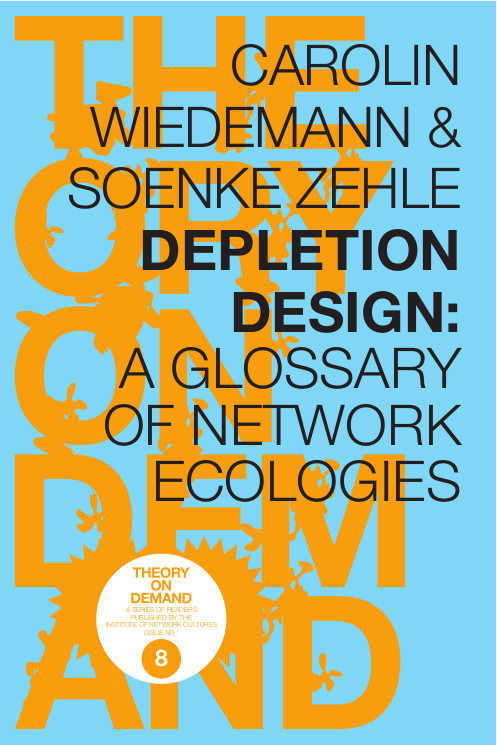Carolin Wiedemann, Soenke Zehle (eds.): Depletion Design: A Glossary of Network Ecologies (2012)
Filed under book | Tags: · algorithm, anonymous, architecture, biopolitics, commons, creative industries, cyborg, design, ecology, hackerspace, media ecology, network ecology, networks, politics, remix, software, spam, technology, theory

“Depletion Design suggests that ideas of exhaustion cut across cultural, environmentalist, and political idioms and offers ways to explore the emergence of new material assemblages. Soenke Zehle and Carolin Wiedemann discuss Depletion Design with Marie-Luise Angerer, Jennifer Gabrys and David M. Berry, inviting tm13 participants into a collaborative reflection on the necessity to understand human beings as one species among others – constituted by interactions of media, organisms, weather patterns, ecosystems, thought patterns, cities, discourses, fashions, populations, brains, markets, dance nights and bacterial exchanges (Angerer); on the material leftovers of electronics as provocations to think through and rework practices of material politics that may be less exploitative within our natural-cultural relationships (Gabrys); and on lines of flight from and through the computational – about expanding them into new ways of living beyond current limitations and towards new means of judgment and politics (Berry).
We, or so we are told, are running out of time, of time to develop alternatives to a new politics of emergency, as constant crisis has exhausted the means of a politics of representation too slow for the state of exception, too ignorant of the distribution of political agency, too focused on the governability of financial architectures. But new forms of individual and collective agency already emerge, as we learn to live, love, work within the horizon of depletion, to ask what it means to sustain ourselves, each other, again. Of these and other knowledges so created, there can no longer be an encyclopedia; a glossary, perhaps.”
Contributors: Marie-Luise Angerer (Cyborg), Franco ‘Bifo’ Berardi (Exhaustion, Soul Work), David M. Berry (On Terminality), Zach Blas (Queer Darkness), Drew S. Burk (Grey Ecology), Gabriella Coleman (Anonymous), Heidi Rae Cooley (Ecologies of Practice), Sebastian Deterding (Playful Technologies, Persuasive Design), Jennifer Gabrys (Natural History, Salvage), Johannes Grenzfurthner & Frank A. Schneider (Hackerspace), Eric Kluitenberg (Sustainable Immobility), Boyan Manchev (Disorganisation, Persistence), Lev Manovich (Software), Sonia Matos (Wicked Problems), Timothy Morton (Ecology without Nature), Jason W. Moore (Crisis), Anna Munster (Digital Embodiment), Eduardo Navas (Remix[ing] Re/Appropriations), Brett Neilson (Fracking), Sebastian Olma (Biopolitics, Creative Industries, Vitalism), Luciana Parisi (Algorithmic Architecture), Jussi Parikka (Dust Matter), Judith Revel (Common), Ned Rossiter (Dirt Research), Sean Smith (Information Bomb), Hito Steyerl (Spam of the Earth)
Publisher Institute of Network Cultures, Amsterdam, Dec 2012
Theory on Demand series, 8
Creative Commons Attribution-NonCommercial-ShareAlike 3.0 Netherlands License
ISBN 9789081857512
via jussiparikka.net
PDF, PDF (updated on 2015-7-9)
Comment (0)Never Mind the Balance Sheet: The Dangers Posed by Public-Private Partnerships in Central and Eastern Europe (2008)
Filed under report | Tags: · central europe, commons, east-central europe, eastern europe, finance, public-private partnership

In recent years public-private partnerships (PPPs) have been heavily promoted in central and eastern Europe (CEE), often giving the impression that where infrastructure is concerned, PPPs are the only game in town. Yet behind the plethora of conferences, workshops and publications, few CEE countries have implemented more than two or three PPP projects, and even fewer truly successful projects.
As George Monbiot, UK author and investigative journalist, says of the Private Finance Initiative, the British variant on PPP: “The reality is that PFI, or public private partnership as the government now prefers to call it, is a scam. (…) Far from introducing market disciplines, it has become an official licence to fleece the taxpayer. Far from reducing the public sector borrowing requirement, PFI is, as the Accounting Standards Board has noted, simply an an off-balance sheet fiddle. Most alarmingly, the ministers I have spoken to simply do not understand how it works.”
Research and writing: Fidanka Bacheva-McGrath, Eliska Cisarova, Akos Eger, Pippa Gallop, Zvezdan Kalmar, Vera Ponomareva
Publisher CEE Bankwatch Network, November 2008
Creative Commons Attribution-NonCommercial-NoDerivs License
60 pages
The Hidden Costs of of Public-Private Partnerships online resource
PDF
PDF (shorter versions in more languages)
Charles Eisenstein: Sacred Economics: Money, Gift, & Society in the Age of Transition (2011)
Filed under book | Tags: · banking, commons, debt, economics, economy, gift culture, gift economy, money, production

Sacred Economics traces the history of money from ancient gift economies to modern capitalism, revealing how the money system has contributed to alienation, competition, and scarcity, destroyed community, and necessitated endless growth. Today, these trends have reached their extreme—but in the wake of their collapse, we may find great opportunity to transition to a more connected, ecological, and sustainable way of being.
This book is about how the money system will have to change—and is already changing—to embody this transition. A broadly integrated synthesis of theory, policy, and practice, Sacred Economics explores avant-garde concepts of the New Economics, including negative-interest currencies, local currencies, resource-based economics, gift economies, and the restoration of the commons. Author Charles Eisenstein also considers the personal dimensions of this transition, speaking to those concerned with “right livelihood” and how to live according to their ideals in a world seemingly ruled by money. Tapping into a rich lineage of conventional and unconventional economic thought, Sacred Economics presents a vision that is original yet commonsense, radical yet gentle, and increasingly relevant as the crises of our civilization deepen.
Publisher North Atlantic Books, 2011
ISBN 1583943978, 9781583943977
469 pages
via Podinski
website dedicated to the book
author
publisher
google books
PDF (EPUB)
View online (HTML)

